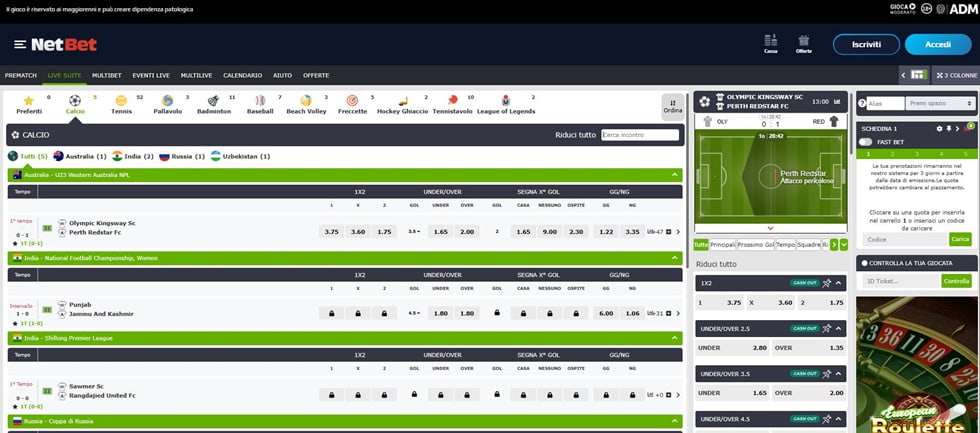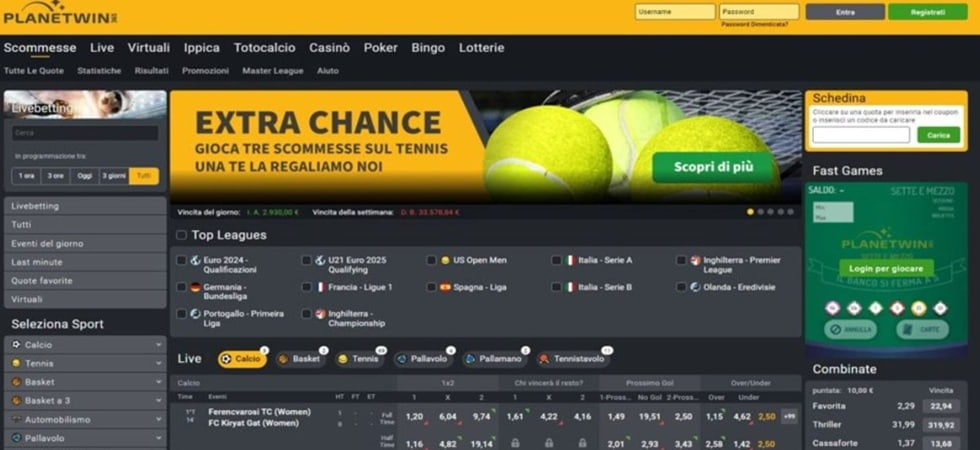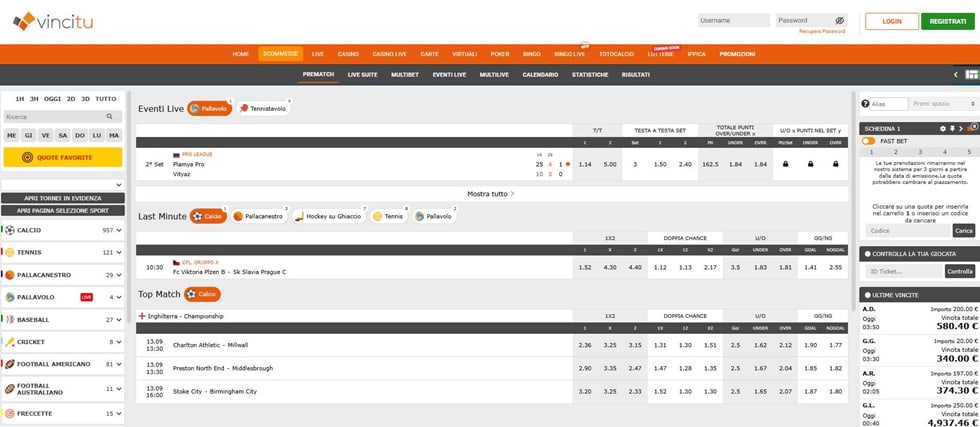Siti scommesse non AAMS – Top Bookmaker Sicuri 2025
Se sei alla ricerca dei migliori siti scommesse non AAMS sei nel posto giusto.
In questa guida abbiamo scritto tutto quello che c’è da sapere su questi operatori.
Vedrai quali sono le loro caratteristiche e quali i loro bonus. Scoprirai come aprire un conto gratis sui bookmaker non AAMS e cosa distingue questi operatori da quelli ADM.
Insomma, vedremo insieme tutto ciò che ti serve per giocare alla grande con queste piattaforme di gioco, in modo sicuro e divertente.
Elenco dei migliori siti scommesse non AAMS del 2025
Bonus di benvenuto di €1000 + 100 giri gratuiti
Bonus di benvenuto di €1000 + 100 giri gratuiti
- Ampia varietà di giochi da casinò
- Giochi dai più grandi studi di sviluppo
- Assistenza clienti cordiale 24 ore su 24, 7 giorni su 7
Bonus di benvenuto del 200% fino a $ 30.000
Bonus di benvenuto del 200% fino a $ 30.000
- Giri gratis e free bet, fino al 25% di cashback per i utenti VIP
- Prelievi immediati e limiti di puntata elevati
- Bonus settimanali fino a $ 100.000
Offerta di benvenuto 250% fino a 3.000 € + 350 FS + 1 Bonus Granchio
Offerta di benvenuto 250% fino a 3.000 € + 350 FS + 1 Bonus Granchio
- Un nuovo casinò online
- Un programma VIP esclusivo al quale aderire e un manager personale
- Opzioni di prelievo ultraveloci
500 € + 50 giri gratis del Jackpot
500 € + 50 giri gratis del Jackpot
- Tornei e promozioni periodiche
- Free Spin per Jackpot milionario
- Assistenza clienti 24/7 e in italiano
Pacchetto di Benvenuto 250% fino a €3.000 + 350 Giri + 1 Bonus Crab
Pacchetto di Benvenuto 250% fino a €3.000 + 350 Giri + 1 Bonus Crab
- Nuovo casinò
- Opzioni di prelievo istantaneo
- Ampia gamma dei giochi da casinò
100% fino a €150
100% fino a €150
- Bonus di Benvenuto fino a 450€ + 250 Giri Gratis
- Cashback settimanale fino al 25%
- Oltre 4500 giochi disponibili
Bonus di benvenuto del 100% fino a 500€ + 200 FS
Bonus di benvenuto del 100% fino a 500€ + 200 FS
- Prelievi istantanei e veloci
- Sia Casino che sito scommesse di ultima generazione
- Assistenza 24/7
Fino a 1000 + 150 Giri Gratis
Fino a 1000 + 150 Giri Gratis
- Nuovo Brand
- Metodi di Pagamento Affidabili e Sicuri
- Pagamenti Veloci
Bonus fino a 2500€ + 350 giri e 2000€ cashback settimanale
Bonus fino a 2500€ + 350 giri e 2000€ cashback settimanale
- VIP Manager su whatsapp e telegram
- Prelievi ISTANTANEI
- Apple Pay disponibile
Fino a €2.000 / €3.000 + 350 giri gratuiti (Cash of Gods di ELA)
Fino a €2.000 / €3.000 + 350 giri gratuiti (Cash of Gods di ELA)
- Bonus casinò e sport
- Ampia scelta di opzioni di pagamento
- Molte promozioni e un club VIP
2000 € + 350 giri gratis
2000 € + 350 giri gratis
- Fino al 15% di cashback settimanale sul casinò
- Enorme pacchetto di benvenuto per il casinò fino a €2.000
- Programma di tornei ricco di azione
100% fino a €1500 + 100 Giri
100% fino a €1500 + 100 Giri
- Transazioni rapide e sicure per un'esperienza di gioco fluida
- Supporto 24 ore su 24, 7 giorni su 7
- Unisciti a una comunità vincente
100% fino a 200€
100% fino a 200€
- Pagamenti rapidi in poche ore
- Programma VIP e assistenza clienti 24 ore su 24, 7 giorni su 7
- Nuovissimo casinò online senza OASIS e LUGAS
1° deposito 200% fino a 400€ - scommessa x8, quota minima 1,60 - 30 giorni per scommettere
2° deposito 150% fino a 300€ - scommessa x8, quota minima 1,60 - 30 giorni per scommettere
Push - 350% fino a 700€
1° deposito 200% fino a 400€ - scommessa x8, quota minima 1,60 - 30 giorni per scommettere
2° deposito 150% fino a 300€ - scommessa x8, quota minima 1,60 - 30 giorni per scommettere
Push - 350% fino a 700€
- Ampia varietà di bonus giornalieri
- Assistenza clienti 24 ore su 24, 7 giorni su 7 in lingua italiana
- Vari metodi di pagamento
225% fino a 1000€ + 300 Giri Gratuiti senza requisiti di scommessa
225% fino a 1000€ + 300 Giri Gratuiti senza requisiti di scommessa
- Giri gratuiti senza requisiti di scommessa
- Premi per i risultati ottenuti
- Assistenza clienti 24 ore su 24, 7 giorni su 7
Bonus 200% fino a 5,000 EUR + Cashback 10% Settimanale
Bonus 200% fino a 5,000 EUR + Cashback 10% Settimanale
- Cashback settimanle
- Prelievi instantanei
- Oltre 4,000 giochi e palinsesto scommesse
200% Bonus di benvenuto fino a 7.500 € + 10% di Cashback
200% Bonus di benvenuto fino a 7.500 € + 10% di Cashback
- Alti limiti di puntata e ottimi provider
- Live Casino con streaming HD
- Accetta VISA/Mastercard e prelievi immediati
Bonus del 200% per i nuovi giocatori fino a 7.500€
Bonus del 200% per i nuovi giocatori fino a 7.500€
- 10% cashback settimanale
- Prelievi immediati
- Scommesse online su 40+ sport
Come promesso, ecco una tabella che riepiloga quali sono i siti scommesse non AAMS affidabili del momento. Li recensiremo in modo più approfondito nelle righe successive.
- BetFlag – tra gli operatori più apprezzati in Italia – Bonus 100% fino a 5.000€.
- Bwin – tra i leader del mercato delle scommesse. Bonus 100% max 550€.
- GoldBet – ha uno dei bonus di benvenuto più ricchi. Bonus multi-chance 12.050€
- NetBet – scommesse e casinò in un unico sito. Bonus fino a 1.000€.
- PlanetWin365 – una miniera di divertimenti a portata di clic. Bonus fino a 2.050€.
- Netwin – un’alternativa interessante per il betting. Bonus registrazione 250€ + bonus deposito 50€.
- StarVegas – ottima scelta per il betting. Bonus fino a 3.000€.
- Unibet – tra i migliori in Italia. Bonus 100% fino a 500€ + Cashback 10% ogni settimana.
- VinciTu – sempre più diffuso tra i giocatori italiani. Bonus 50% fino a 50€.
- William Hill – bookmaker storico in Europa. Bonus fino a 255€.
Migliori siti non AAMS a confronto
| Nome | Bonus | Valutazione |
| BetFlag | Bonus 100% fino a 5.000€ | 4.9/5 |
| Bwin | Bonus 100% max 550€ | 4.8/5 |
| Goldbet | Bonus multi-chance 12.050€ | 4.8/5 |
| NetBet | Bonus fino a 1.000€ | 4.7/5 |
| PlanetWin365 | Bonus fino a 2.050€ | 4.7/5 |
| Netwin | Bonus registrazione 250€ + bonus deposito 50€ | 4.6/5 |
| StarVegas | Bonus fino a 3.000€ | 4.6/5 |
| Unibet | Bonus 100% fino a 500€ + Cashback 10% ogni settimana | 4.5/5 |
| VinciTu | Bonus 50% fino a 50€ | 4.5/5 |
| William Hill | Bonus fino a 255€ | 4.5/5 |
Recensioni dei migliori siti non AAMS sicuri in Italia
BetFlag

Cominciamo da BetFlag, tra i migliori siti scommesse non AAMS più qualificati.
Dentro BetFlag puoi trovare un palinsesto di scommesse sportive degno del miglior bookmaker, una buona facilità d’uso generale e tante offerte che cercano di rendere più conveniente dare fiducia a questo operatore.
C’è anche una buona gamma di giochi non legati alle scommesse. L’area casino di BetFlag è infatti ricchissima, e siamo certi che non ti annoierai.
Per i bonus, il principale è una promo di benvenuto del 100% sul primo versamento fino a un massimo di 5.000€.
Approfittarne è relativamente semplice. Apri il conto su BetFlag, fai un primo versamento e seleziona Sport. Quindi, apri l’email di attivazione e segui i dettagli della progressione del tuo bonus. Gioca e raggiungi gli obiettivi: per ognuno di essi ricevi un accredito sul saldo. Completati tutti gli obiettivi avrai raggiunto il 100% del tuo primo versamento. A quel punto avrai 90 giorni di tempo per l’attivazione.
Vantaggi BetFlag
- Il bonus di benvenuto è molto interessante.
- Il sito può essere usato con grande facilità.
- Ci sono tanti altri giochi a cui dedicarsi.
Svantaggi BetFlag
- Non tutti gli utenti sembrano essere contenti della versione mobile.
Bwin

Bwin è un nome molto conosciuto nel settore delle scommesse sportive. Da diversi anni è infatti uno degli operatori preferiti dagli italiani grazie a un palinsesto di eventi sempre aggiornato e tante quote competitive.
La piattaforma di betting è molto stabile e veloce, così come le guide presenti e il servizio di assistenza clienti. Ottima anche la trasposizione su dispositivi mobili, ideale per chi vuole scommettere con lo smartphone o il tablet.
Passando ai bonus di benvenuto, troviamo un’offerta che comprende 5€ su Aviator + 10€ sulla prima scommessa piazzata + un bonus del 50% fino a 400€ sul primo deposito + 10€ di bonus per 15 settimane + 30 giri gratuiti sulla slot Book of Kings. Una promo molto strutturata che sembra accontentare sia chi ama le scommesse sportive che i giochi da casinò.
Vantaggi Bwin
- La piattaforma è molto veloce e professionale.
- Tante quote competitive.
- L’assistenza clienti risponde tempestivamente.
Svantaggi Bwin
- Il bonus non è tra i più ricchi in circolazione.
Goldbet

Goldbet è un altro dei principali operatori del betting, con tanti vantaggi degni dei migliori siti scommesse non AAMS sicuri operanti in Italia.
Con una piattaforma di gioco stabile e veloce, il sito si presenta agli occhi dei giocatori con un comparto promo davvero notevole. Si può affermare che Goldbet abbia tra i bonus più ricchi di tutto il settore.
Per potenziare al massimo il Welcome Bonus, devi prima di tutto registrarti e depositare del denaro sul tuo conto. Riceverai in questo modo fino a 50€ di Bonus Sport sul primo versamento.
Quindi, gioca il deposito per almeno 6 volte per sbloccare il Bonus Scommesse fino a 2.000€. fatto ciò, se ti registri in Play Bonus Casinò con la Carta d’identità elettronica riuscirai a sbloccare anche un altro Extra bonus che può arrivare fino a 10.000€.
Naturalmente, bonus così ricchi sono destinati ad avere termini e condizioni piuttosto stringenti. Se però fai attenzione a quanto previsto in regolamento, riuscirai a ottenere tutti i benefici di questo pacchetto.
Vantaggi Goldbet
- Ha tra i bonus potenzialmente più ricchi in circolazione.
- Tanti eventi anche su sport non troppo seguiti.
- Gioco stabile e veloce sia su desktop che su mobile.
Svantaggi Goldbet
- Convertire i bonus promessi non è semplicissimo.
Netbet

Netbet è un interessante operatore delle scommesse sportive e del gioco online, che da diverso tempo ha colpito nel segno.
Il merito è di un ottimo mix tra quote competitive, facilità di utilizzo e buona assistenza clienti. Caratteristiche che negli anni lo hanno fatto preferire a molti concorrenti sul nostro mercato.
A fare il resto ci pensano poi i bonus. Quello di benvenuto nell’area delle scommesse sportive prevede un vantaggio complessivo fino a 1.000€. Per poterlo riscuotere basta registrarsi e convalidare il conto inviando un documento di identità, depositare almeno 5€ entro 7 giorni dalla registrazione, e poi giocare il bonus del 100% dell’importo del versamento fino a 1.000€ per almeno sei volte.
I requisiti di scommessa non sono molto stringenti: basta puntare in pre-match o live (no sistemi), con tre selezioni con quota minima di 1.50.
Vantaggi Netbet
- Il bonus è semplice da comprendere e usare.
- Sono davvero tanti i giochi da usare oltre alle scommesse.
- L’assistenza clienti risponde rapidamente.
Svantaggi NetBet
- Diversi utenti segnalano che l’esperienza tramite mobile non è appagante come quella desktop.
PlanetWin365

PlanetWin365 è una vera miniera di opportunità. Oltre ad una sezione sulle scommesse sportive davvero completa, presenta infatti un’area casinò degna dei migliori operatori internazionali.
Molto soddisfacenti sono anche le altre attenzioni che vengono prestate alla clientela. Dei bonus parleremo nelle prossime righe, ma ci piace sottolineare anche un’assistenza clienti che si è sempre dimostrata molto reattiva.
Per i bonus, quello di benvenuto riconosce vantaggi fino a 2.050€. Per prima cosa, ti viene infatti riconosciuto il 100% del primo deposito fino a 50€. Quindi, ti viene riconosciuto anche un bonus scommesse del 100% dell’importo del primo versamento, fino a un massimo di 2.000€.
Per sbloccare il bonus devi effettuare un volume di scommesse pari ad almeno 6 volte l’importo del deposito entro 30 giorni dalla registrazione. Per essere valide ai fini dello sblocco del bonus, le scommesse devono essere almeno in tripla, con quota per singolo evento pari ad almeno 1.50.
Vantaggi PlanetWin365
- La piattaforma di gioco è sempre più professionale.
- Il bonus è piuttosto competitivo e di facile comprensione.
- Si trovano anche tanti sport minori.
Svantaggi PlanetWin365
- Alcuni utenti segnalano che le quote non sono le più convenienti.
Netwin

Netwin si presenta come uno degli operatori delle scommesse sportive meno appariscenti di questa lista. Dietro questa maschera, però, si cela un’offerta competitiva, con un buon livello di quote che potrebbe convincere molti giocatori.
I bonus non sono certo dei più ricchi, ma sono erogati in modo chiaro e trasparente. Oltre al bonus di registrazione di 250€ che viene dato sotto forma di fun bonus, senza necessità di versamenti, è presente un bonus sport del 100% del primo versamento fino a un massimo di 50€.
Vantaggi Netwin
- Si trovano tutti gli sport principali e di nicchia.
- Il livello delle quote è abbastanza competitivo.
- Oltre alle scommesse sportive c’è tanto altro.
Svantaggi Netwin
- La struttura del sito e il livello di bonus sono migliorabili.
StarVegas

StarVegas è da anni una delle migliori scelte per chi cerca un sito di scommesse sportive qualificato e completo.
La piattaforma di gioco è veloce e comprende tutti gli sport, anche meno gettonati. L’assistenza clienti è puntuale. Le informazioni date al giocatore in ogni schermata sono molto efficaci.
Buono è anche il bonus per lo sport. Per ottenerlo basta registrare un conto gioco su questo bookmaker, effettuare il primo versamento e ricevere il 50% della ricarica fino a 3.000€. Scommetti sugli eventi sportivi di tuo riferimento. Il bonus che viene accreditato, deve essere utilizzato una volta al massimo su scommesse sportive con moltiplicatore totale minimo pari a 2.
Vantaggi StarVegas
- Il sito di gioco è molto completo di tutti gli sport.
- Le quote sono competitive su tutte le discipline sportive.
- Il bonus è piuttosto chiaro e si converte abbastanza facilmente.
Svantaggi StarVegas
- Per alcuni utenti l’esperienza sull’app è migliorabile.
Unibet

Unibet è un altro ottimo operatore per le scommesse sportive. Riconoscibile per il suo colore verde, è una bella scelta per il betting.
Sono inoltre previste anche tante altre alternative di intrattenimento per il casinò e il live casinò. Da rivedere la sua struttura dei bonus.
Vantaggi Unibet
- Sito facile da usare.
- Buona velocità di navigazione.
- Palinsesto sportivo molto completo.
Svantaggi Unibet
- Promozioni non ricchissime.
VinciTu

VinciTu è un’altra ottima opzione nel mercato delle scommesse sportive. Dentro questo sito puoi infatti trovare tutti gli sport che vuoi, con un livello di quote molto competitivo. Di facile utilizzo anche la personalizzazione delle schedine, così come l’area delle informazioni statistiche.
Il bonus non è invece dei più ricchi. Quello dedicato allo sport può infatti arrivare solamente a 50€. Per ottenerlo registrati sul sito, invia il tuo documento di identità e deposita una o più volte per arrivare ad almeno 20€ entro 7 giorni dalla registrazione. Riceverai così il 50% del primo versamento fino a 50€.
Vantaggi VinciTu
- Un sito a misura di giocatore.
- L’assistenza clienti ha superato le nostre prove.
- Le quote sono molto competitive.
Svantaggi VinciTu
- Il bonus non è certo ricchissimo.
William Hill

William Hill è un nome che non ha certo bisogno di presentazioni nel mercato delle scommesse sportive a livello internazionale.
Il bookmaker britannico è infatti un vero leader di questo settore, e la sua storia parla da solo. Da quando è entrato nel mercato italiano, poi, ha conquistato rapidamente importanti preferenze.
Questo punto di riferimento non delude nemmeno per i bonus di benvenuto, strutturato con un pacchetto esclusivo di 100€ di bonus cash, 150€ di free bet e 5€ di bonus verifica, per un totale di 255€.
Per beneficiarne basta effettuare la registrazione e indicare Bonus Sport quando richiesto. Effettua un deposito minimo di almeno 20€ con carta di credito o di debito, o PayPal, entro 7 giorni dalla registrazione. Riceverai così un bonus cash del 100% fino a 50€ suddiviso in tranche da 10€ per ogni 10€ giocati.
A quel punto hai 7 giorni di tempo per piazzare scommesse multiple da 5 o più selezioni, con quota minima 5.00 e giocate interamente con denaro reale.
Vantaggi William Hill
- Il bookmaker è un leader internazionale.
- Le quote sono molto competitive.
- Il bonus è di facile comprensione.
Svantaggi William Hill
- Per molti utenti l’app non è sempre all’altezza delle aspettative.
Come registrarsi sui siti scommesse non AAMS sicuri

Registrarsi nei siti non AAMS sicuri è molto semplice. Bastano infatti pochi secondi per riuscire a convalidare il proprio account, riscuotere i bonus e iniziare a giocare:
- scegli i bookmakers senza licenza AAMS tra quelli che abbiamo indicato in questa lista;
- avvia la procedura di registrazione seguendo le indicazioni del bookmaker;
- convalida il tuo conto gioco fornendo una copia dei documenti di identità;
- effettua un versamento con uno degli strumenti di deposito ammessi e riscuoti il bonus;
- accedi con il tuo account e preparati a giocare.
Come vedi, registrarti sui siti scommesse non AAMS sicuri è molto semplice. In ogni caso, se dovessi avere bisogno di assistenza, puoi sempre ricorrere alla live chat o alle altre forme di supporto previste dal bookmaker.
Metodi di pagamento nei siti scommesse non AAMS
Se hai intenzione di giocare nei siti scommesse non AAMS, ti sarà utile sapere che questi operatori accettano numerosi metodi di pagamento.
Li riassumiamo in questa tabella, per parlarne poi in modo più approfondito nelle prossime righe.
| Metodo di pagamento | Tempi di prelievo | Anonimato | Disponibilità nei siti non AAMS | Note |
| Carta di credito | 1-2 giorni | Basso | Molto alta | Richiede documenti di identità. Collegata ai canali bancari. |
| Carta di debito | 1-2 giorni | Basso | Molto alta | Strumento molto diffuso. Collegato direttamente al conto bancario. |
| Carta prepagata | 1-2 giorni | Basso | Alta | In grado di creare fondi dedicati al gioco. |
| Skrill/Neteller | 1-2 giorni | Medio | Alta | Portafogli elettronici molto popolari per la loro rapidità. |
| PayPal | 1-2 giorni | Medio | Alta | Altro portafoglio elettronico molto diffuso in Italia. |
| Bonifico bancario | 3-5 giorni | Basso | Media | Ideale per importi elevati. Più lento delle alternative. |
| Paysafecard | Solo deposito | Alto | Alta | Strumento prepagato, molto sicuro. Separato dai fondi bancari. |
| Criptovalute | Poche ore | Alto | Alta | Non supportate da ADM. Veloci e con un buon anonimato. |
| Token proprietari | Poche ore | Alto | Alta | Molto più rari. Garantiscono vantaggi esclusivi. |
Vediamo ora più nel dettaglio le caratteristiche di ogni strumento.
Carte di credito nei siti non AAMS
Le carte di credito nei siti non AAMS sono uno degli strumenti più diffusi. Sono rapide, garantiscono massimali elevati e hanno il supporto del canale bancario.
Non tutti i giocatori si sentono però a loro agio nel fornire i dati della carta di credito online e per questo motivo si sono diffusi gradualmente altri strumenti come le prepagate o i portafogli elettronici.
Di solito i circuiti accettati sono quelli Visa e Mastercard. Alcuni bookmakers non AAMS legali accettano anche altri circuiti come American Express.
Carte di debito nei siti non AAMS
Le carte di debito nei siti non AAMS sono uno strumento molto simile alle carte di credito. La differenza è nel momento dell’addebito. Le carte di debito prevedono infatti un addebito istantaneo del conto a cui sono collegate. Le carte di credito invece prevedono addebiti il mese successivo (di solito, il 15).
Le carte di debito sono strumenti molto diffusi nei portafogli degli italiani. Pertanto, c’è una disponibilità particolarmente importante. Ed è proprio questa disponibilità ad aver spinto molti giocatori a preferire questo strumento rispetto alle alternative.
Skrill/Neteller nei migliori siti non AAMS
Skrill e Neteller sono due portafogli elettronici molto diffusi a livello mondiale nei siti non AAMS sicuri.
I vantaggi di questo strumento sono tantissimi. Prima di tutto, i portafogli elettronici ti permettono di mantenere separati i fondi destinati al gioco, dai fondi bancari. Quindi, puoi creare una sorta di plafond dedicato, gestendo al meglio i tuoi soldi per il gaming.
Inoltre, garantiscono un buon livello di riservatezza. Non devi infatti comunicare i tuoi dati bancari, ma solamente i riferimenti del wallet. I tempi di trasferimento sono inoltre rapidissimi. I versamenti avvengono in tempo reale. I prelevamenti richiedono davvero poche ore o un giorno.
PayPal nei migliori siti non AAMS
Un altro portafoglio molto usato nei siti scommesse non AAMS è PayPal, diffusissimo anche in Italia.
Come i suoi concorrenti, PayPal permette di ricaricare il conto gioco in maniera molto rapida ed efficace. Puoi tenere separati i tuoi fondi bancari da quelli destinati al betting. E, inoltre, puoi gestire il tutto facilmente e in modo trasparente, con app e pochi tap
Bonifico bancario nei siti non AAMS affidabili
Arriviamo dunque al bonifico bancario. Fino a non troppo tempo fa, il bonifico bancario era lo strumento di riferimento per chi voleva versare denaro nel proprio conto gioco sui siti non AAMS sicuri.
Oggi le cose sono un po’ diverse. Il bonifico bancario è infatti lo strumento di deposito più lento di tutti, richiedendo anche qualche giorno lavorativo per la realizzazione dell’operazione.
Inoltre, non tutti i giocatori si sentono a loro agio nel far sapere alla propria banca che giocano online. Ecco perché sono sempre di più le persone che sono da tempo passate alle carte o ai portafogli elettronici.
Paysafecard nei siti non AAMS
Altro strumento in rapida diffusione è Paysafecard, che può garantire buoni livelli di anonimato e di praticità.
La sua natura è quella di un tipico mezzo prepagato. Pertanto, lo si può attivare con un ticket e poi utilizzare nei bookmakers non AAMS legali all’occorrenza.
Per questa sua caratteristica è molto apprezzato per il livello di anonimato che può dare. Di contro, il meccanismo di richiesta potrebbe sembrare complesso agli occhi di alcuni utenti. Inoltre, non può essere utilizzato in fase di prelievo.
Criptovalute sui bookmakers non ADM
Assenti negli operatori di gioco ADM, le criptovalute sono invece uno strumento molto diffuso nei siti senza AAMS. Merito anche della loro maggiore flessibilità. Non essendo infatti soggetti ai vincoli ADM i siti scommesse senza licenza AAMS hanno maggiore libertà nel momento in cui possono concedere l’uso di strumenti di pagamento come le crypto.
Tra le loro principali caratteristiche ci sono un buon livello di anonimato e la rapidità. Le transazioni di deposito e di prelievo vengono infatti contabilizzate praticamente in tempo reale.
Token proprietari nei bookmakers non ADM
I token proprietari sono uno strumento sempre più diffuso nei siti non AAMS affidabili. Si tratta di gettoni che sono emessi dagli stessi siti non AAMS sicuri per ridurre l’utilizzo degli altri metodi di pagamento.
In cambio, per incentivare il loro uso, i siti scommesse non AAMS riservano particolari vantaggi ai loro utilizzatori, come bonus aggiuntivi. Non sono invece presenti nei siti scommesse ADM.
Bookmakers non AAMS: i bonus di cui devi approfittare
Una delle caratteristiche più interessanti dei siti scommesse è la presenza di tantissimi bonus di cui devi approfittare.
I bonus dei siti scommesse senza AAMS sono infatti davvero convenienti, con tante promozioni dedicate che ora andremo a vedere più nel dettaglio. Vedremo insieme anche quali sono le differenze tra i bonus dei siti ADM e quelli dei siti scommesse sportive non AAMS, notando quanto spesso siano più vantaggio i secondi.
Cominciamo da una tabella di sintesi.
| Caratteristica | Siti scommesse non AAMS | Siti scommesse ADM |
| Bonus di benvenuto | Il valore è molto elevato (supera spesso i 2.000€) | Il valore è più contenuto |
| Bonus ricarica | Percentuale di almeno il 100% con tetto massimo elevato | Percentuale variabile, con tetto massimo più limitato |
| Bonus senza deposito | Sempre presente con un buon credito spendibile | A volte presente, in misura più bassa |
| Cashback | Sempre presente, con una buona durata nel tempo | Più raro, di norma limitato al periodo iniziale di gioco |
| Programmi VIP | Riservano importanti premi ai giocatori più fedeli | I livelli di accesso sono più difficili da conquistare |
| Requisiti di scommessa | Sono più facili da rispettare | Spesso sono molto ostici rendendo difficile riscuotere il bonus |
| Durata del bonus | Di norma almeno qualche settimana | Spesso si esaurisce in pochi giorni |
| Restrizioni ADM | Non soggetti ai regolamenti italiani | Soggetti alle normative ADM |
Vediamo ora nel maggior dettaglio il funzionamento di ogni singolo bonus sui siti senza AAMS.
Bonus di benvenuto sui siti non AAMS affidabili
Il bonus di benvenuto sui siti scommesse sportive non AAMS è la parte più vantaggiosa delle promozioni riservate ai nuovi clienti.
Come dice il nome, è un vero benvenuto caloroso ai nuovi iscritti!
Di norma il bonus di benvenuto è strutturato in un pacchetto di benefici che comprende bonus ricarica, bonus senza deposito, cashback e altri vantaggi.
Nei migliori siti scommesse non AAMS il bonus è di solito la parte più ricca delle promo per i clienti, ma non sottovalutare anche i bonus che troverai più avanti nel tempo.
Il nostro consiglio è infatti quello di valutare i bookmakers non AAMS non solo per i vantaggi che ti danno quando ti iscrivi. Considera anche le promozioni per chi è già cliente, perché spesso è proprio lì che si nascondono le sorprese più interessanti!
Bonus ricarica nei bookmakers non AAMS
Il bonus ricarica è una promozione che moltiplica l’importo del tuo versamento con del credito gratis.
Un esempio ti chiarirà ancora meglio come funziona. Immagina di aprire un conto in un bookmaker non ADM e vedere che ti riconosce un bonus ricarica del 100% fino a 500€.
A questo punto, effettui un versamento dal tuo portafoglio elettronico sul sito del bookmaker per 100€.
Ebbene, il saldo del tuo conto diventerà di 200€, perché i 100€ del tuo saldo reale si aggiungerà al bonus di 100€ del bookmaker.
Il credito gratuito fornito dal bookmaker non sarà però equivalente al denaro reale perché, come vedremo, per essere sbloccato dovrai rispettare alcuni requisiti di scommessa.
Generalmente nei siti scommesse non AAMS i bonus ricarica sono più ricchi di quelli ADM.
Bonus senza deposito nei bookmaker non AAMS

Passiamo dunque ai bonus senza deposito nei bookmaker non AAMS.
Il bonus viene concesso all’utente per essersi iscritto. Non c’è dunque bisogno di effettuare un primo versamento.
Per questo è un bonus molto gradito dai giocatori. Possono infatti avere un credito extra da spendere ancora prima di fare un primo deposito.
L’importo è solitamente piuttosto basso (poche decine di euro). Può però dare la possibilità di avvicinarti al mondo delle scommesse sportive nel migliore dei modi.
Ricordiamo inoltre che per ottenere i bonus sui migliori siti non AAMS è fondamentale convalidare il conto fornendo una copia dei propri documenti di identità.
Cashback
Giungiamo così al cashback. Il funzionamento è semplice. Rimborsa una parte delle scommesse non vincenti sui siti scommesse senza licenza AAMS.
In altri termini, per un certo periodo di tempo, ti verranno rese una parte delle tue puntate non vincenti. Un buon modo per rendere meno spiacevole l’esito negativo del betting.
Di solito il cashback funziona con tre limiti.
Il primo è la percentuale del cashback, di solito pari al 10% o al 20% delle puntate.
Il secondo è il valore in termini assoluti. Il cashback non rimborsa in modo illimitato, ma lo fa entro un limite stabilito anche in cifre (per esempio, 100€).
C’è poi anche un terzo aspetto da considerare: il tempo.
Il cashback non funziona mai in maniera indefinita, ma lo fa tenendo conto del tempo che passa. Per esempio, i cashback dei bonus di benvenuto possono garantire un rimborso per le prime 1-2 settimane.
Se invece il cashback è successivo al bonus di benvenuto, di norma i limiti sono su cadenza settimanale o mensile.
Programmi VIP nei migliori bookmakers non AAMS
I programmi VIP dei siti scommesse senza AAMS sono ottime soluzioni per chi vuole moltiplicare i vantaggi dei bookmaker nel tempo.
I VIP Club sono infatti dei programmi esclusivi che si rivolgono ai giocatori più fedeli, spesso su base crescente.
Man mano che il giocatore punta sui siti scommesse sportive non AAMS accumula punti che gli permetteranno di salire di livello nel programma VIP.
A ogni livello corrispondono dei benefici sempre più importanti, che ti vengono garantiti nel corso del tempo.
Nei bookmakers non AAMS legali di solito questi benefici sono più facilmente accessibili rispetto ai siti scommesse ADM, che invece hanno requisiti più stringenti per scalare la piramide del VIP Club.
Requisiti di scommessa nei siti non AAMS
I requisiti di scommesse nei siti scommesse non AAMS legali sono più generosi rispetto a quelli, più stringenti, dei siti ADM. Ma di cosa parliamo?
In sintesi, i requisiti di scommessa sui siti non AAMS legali sono le regole che il giocatore deve rispettare per poter convertire il suo bonus in denaro reale.
Un classico esempio di requisito di scommessa è il numero di volte che il bonus deve essere giocato per essere convertito in denaro.
Facciamo un esempio. Immaginiamo che uno dei siti non AAMS legali in Italia presso cui hai aperto il conto preveda un bonus di 100€ con un requisito di scommessa di 30x.
Significa che quei 100€ prima di essere convertiti in denaro reale devono essere giocati per 30 volte, ovvero “muovere” giocate per 3.000€.
Superato questo limite, il bonus può essere convertito in denaro e può pertanto essere anche prelevato.
Durata del bonus nei bookmaker non AAMS
Come anticipato, i bonus dei siti non AAMS legali in Italia durano di solito di più di quanto non avvenga nei siti ADM. I siti non AAMS legali in Italia prevedono infatti bonus che non di rado arrivano a durare diverse settimane o oltre un mese.
Nei siti di scommesse ADM, invece, la durata dei bonus è molto più ristretta e generalmente richiede al giocatore un’attività di scommessa piuttosto frequente nei primi giorni di attribuzione della promozione. Naturalmente, maggiore è la durata del bonus e maggiore è anche la comodità e la praticità del suo utilizzo.
Un bonus della durata troppo ristretta potrebbe infatti indurre il giocatore a scommettere troppo, in modo non coerente con la sua strategia.
Restrizioni ADM nei bookmaker non AAMS
Occupiamoci infine delle restrizioni ADM nei siti casino non AAMS. Come intuibile, infatti, i siti casinò non AAMS non sono soggetti ai vincoli tipici dell’Agenzia delle Dogane e dei Monopoli, potendo così gestire le proprie attività di marketing e di gioco in modo più flessibile.
Si tratta spesso di un vantaggio piuttosto importante, perché i siti ADM hanno molte più restrizioni e, dunque, tanti più vincoli nelle loro proposte ai giocatori.
Siti non AAMS sicuri: come trovarli?
La scelta dei siti scommesse non AAMS sicuri richiede un po’ di attenzione da parte tua.
I criteri di selezione sono infatti numerosi e non tutti emergono chiaramente al momento della prima visita del sito dei siti non AAMS.
È proprio per questo motivo che abbiamo analizzato per te tutti i migliori siti non AAMS, da condividere nell’elenco con cui abbiamo aperto il nostro approfondimento.
Se però vuoi fare da solo e vuoi andare alla ricerca autonoma dei migliori bookmaker non AAMS, nelle prossime righe vedremo insieme quali fattori abbiamo analizzato.
Siti senza AAMS: che licenze usano?
Per prima cosa, soffermiamoci sulle licenze. Anche se siamo davanti a bookmakers non AAMS, non significa che la società operi senza autorizzazioni.
I siti non AAMS, infatti, operano sulla base di licenze che non sono italiane, sono attribuite da mercati stranieri, con regole diverse da quelle dell’ADM, ma non necessariamente meno rigide o sicure.
Per questo motivo è sempre bene controllare quali sono le credenziali dei siti non AAMS. Verifica dunque dove sono registrate e dove hanno sede, e se le loro licenze sono aggiornate e hanno una buona nomea.
Opinioni e pareri sui migliori bookmaker non AAMS
Un altro elemento molto importante nella valutazione dei migliori bookmaker non AAMS sono le opinioni e i pareri di chi ha già provato quell’operatore e ti ha preceduto nell’esperienza di gioco.
Anche in questo caso, non sarà difficile trovare le valutazioni di chi ha già provato i siti senza AAMS.
Dai social media ai portali di valutazione dei siti web, ogni bookmaker si porta dietro con sé migliaia di opinioni che ti permetteranno di avere le idee un po’ più chiare su chi hai davanti.
Su quali sport scommettere nei bookmakers non AAMS
Una volta che ti sei accertato quale sia la licenza del bookmaker che hai scelto e quali le opinioni che lo circondano, bisogna comprendere quali siano gli sport su cui ti permette di fare betting.
I bookmakers non AAMS, per fortuna, hanno un ventaglio di discipline sportive molto ampio e non avrai certo difficoltà di trovare l’evento che fa per te.
Il nostro suggerimento è quello di dare uno sguardo attento al palinsesto dei bookmakers non AAMS per controllare sia la presenza di diversi sport, sia la profondità del palinsesto stesso.
Controlla per esempio se le scommesse sul calcio nei siti di scommesse non AAMS si limitino ai principali campionati nazionali, o se invece ci sia un livello di dettaglio maggiore, fino a comprendere anche le serie minori.
Un consiglio per andare dritto al punto del bookmaker non AAMS
Naturalmente, se sai già che dedicherai buona parte delle tue attività di betting nei siti di scommesse non AAMS su uno o più sport in particolare, controlla in modo più specifico che ci sia un’offerta competitiva proprio su quelli.
In questo modo riuscirai a trovare ancora più rapidamente il tuo bookmaker non AAMS di riferimento, evitando di cadere nella confusione di decine di altre caratteristiche di vantaggio che potrebbero risultare superflue.
Le quote nei siti scommesse senza licenza AAMS
Facciamo dunque un altro passo in avanti nella valutazione dei siti non AAMS sicuri.
Scelto il bookmaker non AAMS per licenza, opinioni e disponibilità del palinsesto di eventi sportivi, bisogna anche capire se le quote degli eventi siano o meno competitive. Ma come rendersene conto?
La cosa più semplice è ovviamente quella di affidarsi alle nostre valutazioni dei siti non AAMS sicuri.
Confronto quote sui siti di scommesse non AAMS
Se però vuoi controllare in autonomia qual è il livello di competitività delle quote dei siti scommesse non AAMS che hai individuato, puoi fare un confronto diretto e manuale tra i valori riportati su alcuni eventi di tuo interesse nel bookmaker non AAMS.
Oppure, puoi affidarti a specifici comparatori di quote dei siti di scommesse non AAMS che puoi trovare online, e che semplificano la vita a chi ha l’abitudine di fare frequenti analisi delle quote dei bookmakers non AAMS alla ricerca di quella più vantaggiosa.
Siti non AAMS: come trovare il giusto bookmaker
Il nostro consiglio in questo senso è quello di non farsi prendere dal panico. Non serve controllare nel dettaglio tutti i bonus sui siti scommesse non AAMS o gli sport a disposizione su cui scommettere. Molto meglio, invece, fare una breve analisi del proprio profilo di scommettitore e capire di conseguenza su quale leve ci conviene agire nei siti non AAMS.
Se per esempio siamo degli scommettitori dei siti non AAMS molto frequenti, scegliere uno dei siti non AAMS con cashback bonus settimanale potrebbe essere conveniente, perché ci garantirebbe un rimborso periodico delle nostre puntate non vincenti nei siti non AAMS.
Se invece oltre alle giocate sui siti di scommesse non AAMS si vuole giocare anche al casinò online dello stesso bookmaker non AAMS, potrebbe essere più conveniente puntare su un welcome bonus dei siti non AAMS più vario, che comprenda anche bonus slot, free spin e altri vantaggi.
Bookmaker non AAMS: bonus per vecchi e nuovi clienti
Nell’analisi dei vantaggi dei siti scommesse non AAMS, non fermare la tua valutazione ai soli bonus di benvenuto, ma soffermati anche sulle promozioni previste per chi è già cliente dei siti non AAMS.
Spesso, infatti, i maggiori vantaggi dei siti non AAMS si nascondono proprio dietro le promozioni che sono riservate a chi è già utente.
Migliori siti scommesse non AAMS: assistenza clienti
Un altro elemento da non scordare è l’assistenza clienti nei siti non AAMS. Nei siti scommesse non AAMS, infatti, il customer care è raggiungibile attraverso diversi canali come live chat, email, telefono, social media.
Nella maggior parte dei casi ci si troverà dinanzi a piattaforme non AAMS che indurranno il giocatore a contattare il customer care tramite email. Se però per te è importante un contatto telefonico diretto, orienta la tua scelta verso quei siti non AAMS che permettono la telefonata come forma di supporto a distanza.
Informazioni e statistiche nei migliori siti non AAMS
Ogni giocatore sui siti scommesse non AAMS sa molto bene quanto sia importante formulare le proprie previsioni sulla base di dati e informazioni.
Ecco, dunque, che sarebbe sempre opportuno scegliere il bookmaker non AAMS anche sulla base del patrimonio informativo che è in grado di darti. Valuta se il bookmaker non AAMS riesce a fornirti informazioni aggiornate sui precedenti, sulle formazioni probabili e su quelle ufficiali, su tutte le news sulla squadra e così via.
Maggiori sono le informazioni così fornite e maggiori saranno anche gli elementi che potrai utilizzare per rendere la tua scommessa sul bookmaker non AAMS sempre più consapevole.
Cos’è il live betting nei siti scommesse non AAMS italiani
Il live betting nei siti non AAMS è la pratica che consente ai giocatori di scommettere sugli eventi sportivi proprio mentre sono in corso sul bookmaker non AAMS.
Il vantaggio è notevole. In questo modo è infatti possibile scommettere sui match approfittando delle informazioni sulle partite mentre sono in corso di svolgimento.
Inoltre, si potrà godere di un maggiore senso di partecipazione, tipico di quanto si guarda una partita quando si è anche coinvolti come scommettitori.
Cosa sono le scommesse virtuali nei siti scommesse non AAMS
Le scommesse virtuali sui siti non AAMS sono delle vere e proprie scommesse che, invece che vertere su match reali, avvengono su match virtuali.
Le partite sono create continuamente dai siti scommesse non AAMS tramite algoritmo, permettendo così a ogni scommettitore di giocare in qualsiasi momento voglia.
Conclusioni sui top bookmaker non AAMS nel 2025
Siamo dunque giunti alla conclusione di questa lunga guida sui migliori siti scommesse non AAMS.
Abbiamo cercato di fare il punto su tutto ciò che riteniamo importante, dalla comprensione dei bonus all’analisi dei criteri che ci hanno spinto a indicare alcuni dei migliori siti non AAMS nelle scorse righe.
Ma che valutazioni finali possiamo trarre da tutto ciò?
Prima di tutto, trovare i migliori siti non AAMS non è difficile. Gli operatori professionali e stranieri del gioco online sono numerosi e ciascuno sembra poter apportare qualche vantaggio esclusivo agli scommettitori.
Il nostro suggerimento è quello di avvicinarsi con la giusta fiducia al settore, ricordando le indicazioni di cautela e di tutela che abbiamo sopra riassunto.
Aprire un conto gioco sarà molto facile e il fatto che molti dei siti di scommesse non AAMS abbiano al loro interno dei bonus senza deposito, ti permetterà di provarli senza dover fare alcun versamento.
FAQ
Vediamo insieme alcune risposte alle domande più frequenti sui siti senza AAMS.